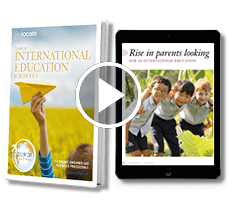China’s insatiable appetite for a western education
There is huge demand in China from aspirational parents wanting a western-style education, leading to the best international opportunities that money can buy, for their children. Equally expatriate parents prize the value of educating their children in this dynamic relocation hotspot. But the school numbers can be confusing. What are the options?
Education challenges
The cost of attending fee-paying English-medium schools in the region, with the scarcity of school places, can create a significant challenge for relocating families but the good news is that increasing numbers of British independent schools are opening their doors there. Dulwich College led the way in 2004 and now has four schools; two in Shanghai and one each in Beijing and Suzhou. It was followed in 2005 by Harrow, which opened a school in Beijing. Since then there has been a steady flow of British Independent schools opening in the country. Recent additions include King's College School and Lucton School which opened in September 2018 and Uppingham School in 2019. Westminster School and Wycombe Abbey International School plan to open in 2020, all of which will be accepting both expat and Chinese children. In February 2018, former UK Prime Minister Theresa May’s visit to China saw education deals worth more than £550 million, including several new school developments involving British school brands.Latest estimates expect the number of students at English international schools in China to grow from 475,000 in September 2017 to 881,000 by 2022. Demand from locals has an important role to play as explains Mr Gaskell, “In 2017, there were 7,990 students from China in UK independent schools. In 2018, there are 9,008 – an increase of 13% year-on-year.”
Since then there has been a steady flow of British Independent schools opening in the country. Recent additions include King's College School and Lucton School which opened in September 2018 and Uppingham School in 2019. Westminster School and Wycombe Abbey International School plan to open in 2020, all of which will be accepting both expat and Chinese children. In February 2018, former UK Prime Minister Theresa May’s visit to China saw education deals worth more than £550 million, including several new school developments involving British school brands.Latest estimates expect the number of students at English international schools in China to grow from 475,000 in September 2017 to 881,000 by 2022. Demand from locals has an important role to play as explains Mr Gaskell, “In 2017, there were 7,990 students from China in UK independent schools. In 2018, there are 9,008 – an increase of 13% year-on-year.”Types of international school in China
Four distinct types of international school are allowed by China’s Ministry of Education:- Schools for Children of Foreign Workers (SCFW), colloquially known as ‘expat schools’, provide international education for the expatriate community and are also accessible to the children of Chinese families who have a foreign passport, and ethnic Chinese students migrating from other Asian countries. They are not allowed to enrol Chinese nationals. They do not have to offer the local curriculum.
- Sino-Foreign Cooperative Schools are joint ventures between a Chinese owner and a foreign education company or school. These are restricted to secondary and higher education. The foreign organisation typically provides the teaching and learning, while the Chinese partner provides the land and financial investment. Both expatriate and Chinese students can attend these schools.
- Chinese-owned private schools are able to provide bilingual learning. An increasing number of Chinese/English bilingual private schools that have a distinctly international focus are opening. Many offer internationally recognised examinations and diplomas. These schools mostly serve Chinese students.
- A few Chinese-owned public/state schools are now running an international stream as an option for high-school students.
The benefits of learning Chinese
There is an increasing need for private Chinese bilingual schools such as 3e International School, Beijing, as expatriates recognise the importance of learning Chinese and locals embrace the opportunities of the English language.Results of a survey of UK business leaders earlier this year showed that 77% of them believe that speaking Mandarin Chinese will give school leavers a career advantage and the UK government is investing in programmes to help students learn the language. The British Council’s Mandarin Excellence Programme – running in participating British schools since 2016 – will see 5,000 students on track to fluency in Mandarin by 2020.At 3e International School in Beijing, the students are approximately half Chinese nationals and half expatriates. It is a dual immersion bilingual school – children spend half of the day in an English classroom with two lead English teachers and half of the day in a Chinese classroom with two lead Chinese teachers and they also attend special classes in Art, Music and Sport.Explains Joanne O’Connor, the school’s Community Liaison Officer, “To really learn a language fluently you need to spend sufficient time in that language, every day, learning and practising with teachers, classmates, friends and family. The balanced structure at 3e International School provides students with confidence to know they will spend at least half a day in their native language, and half a day in their developing language.“The worldwide possibilities which open up to them by being fluent in Chinese help them to grow into globally minded young adults who can communicate, appreciate and respect others across all cultures. It’s really exciting to consider what the future may hold for them.”The balanced bilingual education at 3e has also tempted Joanne O'Connor to send her two children to the school, as the family plans to stay in China for a while."Learning Chinese helps them to get the full experience of living in China," says O'Connor, who is proud that her elder daughter in Grade 2 can recite Chinese poems and sing Chinese songs just like a native speaker."The high teacher-student ratio helps my child, and instills self-discipline," she says.Exploring a range of schools and other curricula
The International Baccalaureate (IB)
There are 129 IB World Schools in China that teach one or more of the four IB programmes. Of these, 100 teach the Diploma Programme (DP) and two teach the Career-related Programme (IBCP). Shanghai Community International School (SCIS) was one of the first international schools in Shanghai to become an IB World Continuum School and its students come from more than 60 nationalities.Explains a spokesperson for the school, “This accreditation extends across all three SCIS campuses, including Hongqiao and Pudong, providing a seamless programme for students aged two to 18, and comprised of the Primary Years Programme (PYP), Middle Years Programme (MYP), and the Diploma Programme (DP).”The American Curriculum
Concordia International School in Shanghai was established in 1998 and teaches the American curriculum from Pre-school 3 to Grade 12. In addition to excellence in academics, the school is embracing the trend to equip students with the soft skills necessary to thrive in the future workplace.“As entrance to top colleges becomes more selective and 21st century skills become more important to life success, leading schools are creating independent curriculum that sets students apart in the college application process,” says Patrick Love, high school counsellor.Another school offering the American curriculum is the oldest and largest international school in Shanghai – Shanghai American School. Built on two campuses, it provides a US-oriented curriculum for more than 1,700 children and boasts the largest English-language library in China.Change ahead
As the thirst for a western-style education and the benefits of a bilingual education become increasingly desirable to both locals and expatriates, it is expected that the explosion in international schools is likely to continue. However, in a recent development on admissions rules, from 2020 all schools teaching Chinese children aged seven to fifteen will have to use an admissions lottery system rather than selection. Speaking to The Times, Richard Gaskell, director of ISC Research said, “There is a backlash against the rapid increase in private schools in China, particularly from the big public schools where it’s perceived that they have been simply creaming off the best kids.” The Chinese government has already introduced rules requiring the Chinese national curriculum to be taught alongside an English national curriculum and GCSEs. It remains to be seen what impact this will have on British and other private schools wanting to expand or open in China.This article is from Relocate Global's Guide to International Education & Schools 2019/20 which is packed with expert tips and information for those relocating and the professionals supporting them. For volume options, co-branded editions, digital or online licence agreements and advertising opportunities, contact Fiona Murchie at +44 (0)1892 891334 or email fiona@relocatemagazine.comNow available as an ebook on Amazon! Simply download from Amazon onto your Kindle, mobile phone or tablet to read wherever you are!
Subscribe to Relocate Extra, our monthly newsletter, to get all the latest international assignments and global mobility news.Relocate’s new Global Mobility Toolkit provides free information, practical advice and support for HR, global mobility managers and global teams operating overseas.
 Access hundreds of global services and suppliers in our Online Directory
Access hundreds of global services and suppliers in our Online Directory For more education and school-related news, visit our Education and Schools pages.© 2019. This article first appeared in the 2019/20 edition of the Guide to International Education & Schools published by Relocate Global, Spray Hill, Hastings Road, Lamberhurst, Kent TN3 8JB. All rights reserved. This publication (or any part thereof) may not be reproduced in any form without the prior written permission of Relocate Global. Relocate Global accepts no liability for the accuracy of the contents or any opinions expressed herein.
For more education and school-related news, visit our Education and Schools pages.© 2019. This article first appeared in the 2019/20 edition of the Guide to International Education & Schools published by Relocate Global, Spray Hill, Hastings Road, Lamberhurst, Kent TN3 8JB. All rights reserved. This publication (or any part thereof) may not be reproduced in any form without the prior written permission of Relocate Global. Relocate Global accepts no liability for the accuracy of the contents or any opinions expressed herein. ©2026 Re:locate magazine, published by Profile Locations, Spray Hill, Hastings Road, Lamberhurst, Kent TN3 8JB. All rights reserved. This publication (or any part thereof) may not be reproduced in any form without the prior written permission of Profile Locations. Profile Locations accepts no liability for the accuracy of the contents or any opinions expressed herein.































